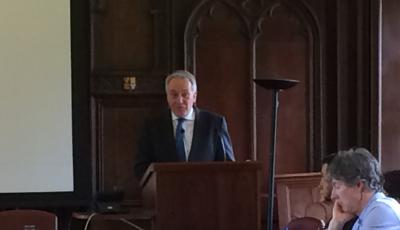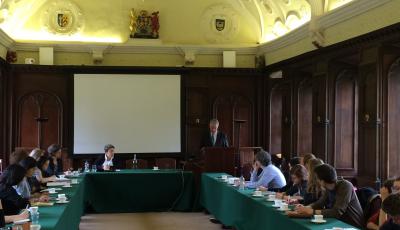
He began with the question ‘do we even need terrorism laws at all?’ and provided a compelling case for both sides of the terrorism legislation debate, considering the pros and cons in light of current examples. Terrorism legislation is a fairly new phenomenon in many jurisdictions; Australia and Canada are among the many nations that didn’t have terrorism laws prior to the 9/11 terrorist attacks.
On the one hand, terrorist incidents occur very rarely in comparison to other crimes in Great Britain, and the volume of legislation focused on preventing terrorism doesn’t reflect its actual occurrence. Terrorism is sensationalised by the media and the target of much political rhetoric. Fear levels often associated with terrorism are not always accurate. As Mr Anderson points out, the more we glamorise terrorist activity by treating it as ‘uniquely grave,’ the more we serve the interests of its perpetrators. Counter-terrorism laws can thus create more of a problem than the terrorist acts themselves.
On the other hand, extremist activities destroy lives as well as economies and regimes such as tourism (take the recent attacks in Tunisia, for example). Terrorism promotes prejudice and damages community relations. It also has the potential to kill far greater numbers of people than it typically does. Potentially, the low number of terrorist-related deaths in the UK can be attributed to high quality intelligence and police and prosecutorial efforts, facilitated by counter-terrorism legislation.
Initially, counter-terrorism laws in the UK were characterised by a focus on prevention, seen clearly in the enactment of preparatory offences and Control Orders. However, in his first few years as Independent Reviewer (2010-2014), Mr Anderson witnessed a ‘notable relaxation’ in the stringency of these laws. The section 44 ‘no suspicion’ police power was repealed; the initial 28-day maximum period to detain without charge was reduced to 14 days; and the Control Order scheme was replaced by less onerous Terrorism Prevention and Investigation Measures (TPIMs). He argued this was a consequence of political change, which has subsequently been reversed: we are now under increased threat levels and bearing the brunt of concerning new legislation such as ‘citizenship stripping’ and Temporary Exclusion Orders. The definition of terrorism remains unnecessarily broad, and prescription orders have posed bars to foreign aid. The scope for further rolling back counter-terrorism laws is limited as most have been upheld by the courts.

Other questions focused on Mr Anderson’s impact as Independent Reviewer; for example, has having a ‘critical voice’ enhanced his impact or undermined it? Mr Anderson highlighted the importance of not confusing independence with being critical of the government. In an honest account of his impact as Independent Reviewer, he acknowledged that in some respects, his recommendations were discarded—such as bail for terrorist suspects—but in other respects, he’s proud of the impacts he made. Mr Anderson noted that felt he had the most impact under the Coalition government. For example, in respect of his report on TPIMs, all of his recommendations for improvement were accepted. In the Miranda case, concerning powers to stop without suspicion, he saw his recommendations filtering through to the courts.
The seminar provided an insightful snapshot of a day (or many!) in the life of the Independent Reviewer. Mr Anderson’s friendly, humorous demeanour and honest outlook was refreshing, and a fantastic start to the Centre’s 50th Anniversary Lecture Series.
For more on issues of criminal justice and security, please attend our Annual Roger Hood Public Lecture on 3 June 2016 featuring the University of Oxford’s Professor Lucia Zedner speaking on ‘‘Criminal Justice in the Service of Security.’ Register for this free event here.
Share:
